Peter MALONE
Saturday, 18 September 2021 19:54
Harry Potter and the Order of the Phoenix
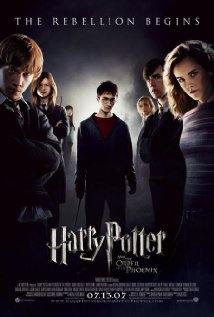
HARRY POTTER AND THE ORDER OF THE PHOENIX
UK, 2007, 138 minutes, Colour.
Daniel Radcliffe, Rupert Grint, Emma Watson, Imelda Staunton, Gary Oldman, Michael Gambon, Fiona Shaw, Richard Griffiths, Geraldine Sommerville, Ralph Fiennes, Brendan Gleeson, George Harris, Mark Williams, David Thewlis, Maggie Smith, Julie Walters, Alan Wickham, Helena Bonham Carter, Julie Waters, David Bradbury.
Directed by David Yates.
This is Harry Potter time. With the release of the last book in the series (and sales of millions) and the fifth film in the series, Harry Potter is a worldwide phenomenon.
Six years ago, when the first film came out, there was a great deal of heated discussion. Children and adults who were content to move into a fantasy world that looked at times a little like ours but was vastly different enjoyed the opportunity to make believe. What if…? On the other hand, a number of fervently religious people were alarmed at the words ‘magic’ and ‘spells’ and ‘wizard’ and interpreted the story as being against some of the literal injunctions of the Old Testament.
We hope that this discussion has been resolved, realising that J.K.Rowling was just inventing a world that was another fairy tale place with some adolescent epic touches. This is not a world to be taken literally. It is more like the imaginative world that J.R.R. Tolkein invented for the Lord of the Rings or that George Lucas invented for the Star Wars series. In fact, it is a useful comparison to make between Harry Potter and Frodo as well as with Luke Skywalker. They are young heroes who bear some of the burdens of evil in the world and receive a mission to combat evil.
This mission is becoming clearer as the books and the films continue. Harry started as a young boy. We have seen how he has changed as he moved through the early years of adolescence. Last time, Harry came face to face with the personification of evil, someone who had chosen to ‘go over to the dark side’, Voldemort. This film is literally darker as Voldemort now moves in on Harry to create an evil world. Harry has to draw on inner resources to be able to live up to his mission.
This time he has the support of his parents’ friends, the Order of the Phoenix (with its name of hope for rising again) and of his godfather, Sirrius Black. He also has to learn that he is not alone and rely on the support of Ron and Hermione (even if it means listening to lectures from Hermione).
This is a film for adolescent audiences. The classification is 12A or its equivalent which means that parents have to decide whether they want their younger children to see the film. If young children have started with the other books and films then they will know what to expect. Otherwise it could be puzzling and frightening.
Most of the familiar cast have returned, even if some of them have only a few moments. Adults will regret that there is not more of Emma Thompson, Maggie Smith and Robbie Coltrane. However, there is a new character who leaps off the screen at us as she tries to control Hogwarts and impose her kind of order. This is Dolores Umbridge, sent by the ministry to correct what are considered Dumbledore’s mistakes. She flounces around in pinks and mauves completely self-satisfied. Imelda Staunton gives a wonderful performance.
There are plenty of special effects that are amazing to watch, a delight that technology can create so much magic.
This is a review of the film, not the book – readers always find that the filmmakers have left out characters and incidents that they really wanted to see. But, as a Harry Potter film, the Order of the Phoenix should satisfy.
1. The popularity of the books, the films? Harry Potter becoming older, nearing the end of the series?
2. The locations, the family homes, London, the mysterious London behind-the-scenes? Hogswart? The musical score?
3. The role of magic, the school, the magicians, the staff? The special effects, flight, giants, Voldemort, the conflicts and battles?
4. Harry, the teenager, in himself, his concerns, his fate, the influence of Voldemort, the photos of his parents? His cousins, their persecution? The attack of the boys, the conflict in the overpass, the presence of evil, Harry using the spell, letting it be seen? Taking his cousin home? The old lady as the witness? Moody, his urging Harry to leave, going to the city, the house for the Order, the range of members present, Sirius Black, the Weasleys, Remus Lupin, Moody? Meeting Hermione and Ron, trying to listen? Everybody flying to safety?
5. The Ministry, the dogmatic attitudes of the Minister, his pomp, television interviews, that Voldemort was not appearing, the newspapers, headlines and pictures? The arrest of Harry, the hearing, the Minister, the members all solemnly sitting, Dolores in pink, loyal, the laws? The questioning, Dumbledore appearing? The judgement and Harry innocent?
6. Dolores and her appointment to Hogwarts, her presence, address, the pink, her speech? The staff present, Snape, Miss McGonigal?, Sybil, Moody, Filius Flitwick? Dumbledore welcoming her? Her takeover, the clash with Miss McGonigal?, dismissing Sybil, in class, the rules, conservative? Harry and his clash? Her exercise of power, with the students? Taking her to Hagrid, the giant, her fears?
7. Professor Snape, Harry, the warnings, about his father, Voldemort?
8. The difference appearances the different appearances of Voldemort, his appearance, the effect? Dumbledore referring to him as Tom? The attack on Harry, the breath?
9. Hagrid’s return, help, his brother, the giant, fears? With Dolores?
10. Sirius Black, Remus Lupin? Their interest in Harry? Mr Weasley taking him to the Ministry?
11. Sirius, the past, the prisoner, the accusation of crimes? Harry’s Godfather? help, talk, encouragement, his appearance, his fighting and dying? The Minister’s denunciations?
12. The appearance of Malfoy, his son?
13. The release of Bellatrix, her madness, appearance, the attacks, mayhem?
14. Dumbledore, at Hogwarts, his disappearing, his testimony the Harry? Against Dolores?
15. The film building on the story, the confrontations, the Order, support, saving Harry? The intimations for Harry’s future?
Published in Movie Reviews
Published in
Movie Reviews
Tagged under
Saturday, 18 September 2021 19:54
Montana Sky
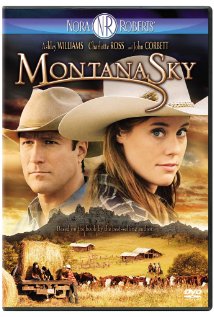
MONTANA SKY
US, 2007, 96 minutes, Colour.
Ashley Williams, Charlotte Ross, Diane Ladd, Laura Mennell, Nathaniel Arcand, l Aaron Pearl, John Corbett.
Directed by Mike Robe.
Montana Sky is based on a novel by Nora Roberts, the author of many popular novels, 10 of which were made into television movies.
This is a story about a rancher, a hard man in Montana, who dies and leaves his property to his three daughters, by separate mothers, as long as they stay there for a year and work the ranch, under the supervision of the sheriff and a neighbouring cowboy. The film opens with a funeral, and two of the daughters arriving late, one a woman with low self-image, Lily, brutalised by her former husband, the other, Tess, a Hollywood writer, full of ostentatious glamour. The third is Wilma, the daughter, shown little affection by her father, who manages the property.
Ashley Williams is sympathetic as the hard manager. Charlotte Ross is all Hollywood style as Tess, and Laura Mennell is suitably demure as the harassed wife, falling in love with an Indian who works on the property, ultimately confronted by her husband. John Corbett is the neighbour who is in love with Wilma.
The film shows the mellowing of Wilma and the inevitable falling in love, Tess becoming used to living in Montana, and Lily marrying the Indian. When all seems to be settled against Lily’s husband, another villain is dropped in, somewhat ex machina.
The novel, the situations and characters have been compressed into just over an hour and a half, limiting the scope of the novel.
1. Popular novel? Popular television movie? The target audience? Male, female?
2. The Montana settings, the scenery, the spread, the mountains? The town, shops and the sheriff’s office? Authentic? Musical score?
3. The title, the focus on Montana, the way of life there, the cowboys, the tradition, the modern ranches?
4. The opening, the funeral, the touch of King Lear, Tess and the late arrival, Lily, Ben and his absence? Wilma and her wanting to get to work, attitudes towards her sisters, the reading of the will, the money to the housekeeper, to the ranch manager, and the clauses about the three daughters having to live for a year, work together, then being able to inherit? Lily and her fears, having nowhere to go? Befriended by Adam? Tess, her Hollywood writing, her lifestyle, not wanting to stay, the compulsion of the will?
5. The development over the year, Tess, feeding the horse, the difficulties, attraction to Nate, making the three agree that they would work together, the meeting in the jacuzzi? Her attraction towards Nate, his manners, the gradual approach? Lily, her time with Adam, Wilma and her hard work, resisting Ben, sparring, his helping, the invitation to the dance, her dress, the sexual relationship?
6. The killing of the cattle, the killing of the dog? Suspicions about Lily’s husband? The sheriff, the enquiries, the contact in Mexico? His arrival, confronting Lily, shooting Adam, taking Lily, the car, Lily crashing the car, through the woods, across the river, the information, the picnickers phoning the sheriff, the sheriff and the threat to shoot Jesse, his holding Lily as hostage, Wilma’s move, shooting him? Adam and his recovery?
7. Seeming peace, the sisters working together, the preparation for the wedding?
8. The previous mention of the son who was turned away with his mother, the revelation of the hand being the son, his wanting the property, his despising his sisters, threatening Wilma, Ben and his arrival, the shooting, the confessing to the killing of the cattle and the murders of the hand and the prostitute?
9. The happy ending, dancing, and everyone with a future in Montana?
Published in Movie Reviews
Published in
Movie Reviews
Tagged under
Saturday, 18 September 2021 19:54
Asterix at the Olympic Games
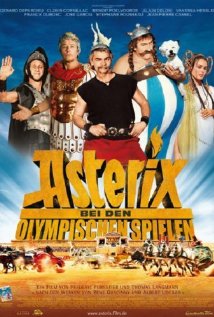
ASTERIX AT THE OLYMPIC GAMES
France, 2008, 116 minutes, Colour.
Gerard Depardieu, Clovis Cornillac, Benoit Poelvoorde, Vanessa Hessler, Alain Delon.
Directed by Frederic Forestier, Thomas Langman.
In the 1960s there were several animation films, bringing to light the comic strips of the Asterix stories, life in Gaul at the time of Julius Caesar, the resistance and the freedoms. Asterix was the leader, Obelix the humorously oafish friend. Over the decades there were many more stories, even the Gauls going to Britain, to Egypt, encounters with Cleopatra and, with this film, to the Olympic Games.
One of the humorous aspects was the giving of names to characters and resemblance to different functions, captured in the English subtitles, for example, the carrier pigeon being called Telegraphix, and the romantic hero being called Lovesicx.
Many of the fans were not enthusiastic about the live-action films but for those who enjoy ancient stories, resembling the modern stories, with a larger than life characters, there is quite some amusement – although the appearance of contemporary sports stars at the end of the film as well as digressions about tennis, the invention of soccer and basketball, are stuck in their time.
1. The popularity of the Asterix stories, comic strips, comic books? The film versions – animated? Live-action?
2. The entertainment value of this story, of the Gauls, of Asterix and Obelix, in Gaul, in Greece, the Olympic Games? The details of the games? Musical score?
3. The French names for the various characters, the humour in the translation into English?
4. Lovesicx, his communicating with Irene, the carrier pigeon, Telegraphicx, his decision to travel to Greece and seek her hand? His adventures along the way, arrival, disguised as a servant, seeing Brutus, letting it be known that he wanted Irene’s hand? Her father, his reaction, wanting her to marry Brutus? Her suggestion that whoever won at the Olympic Games should get her hand?
5. The introduction, Gaul, the presence of the Romans, the role of Julius Caesar? The independence? With Caesar calling them Gallo-Romans? The qualities – shown with chasing the Roman jogging, their speed?
6. The decision to go to Greece, to take the druid priest, to help with the games? And Dogmaticx going as well?
7. Brutus, foolish, with his troops, their surface support, their thinking him idiotic? His return from the war, his awkwardness on the horse, falling off, the eagle? His dislike of his father, his father’s dislike of him? His courting Irene, the proposal about the games, his accepting? His advisers, his training, getting the best Roman athletes, getting potions, cheating? His participation in the games, his ways of cheating, winning, his father’s spurning him? His plot against his father? The decision resting on the chariot race? His performance, stealing the Druid’s potion, the extra power, flying around the course, getting rid of others? His final crossing the line, the accusations of cheating, the irony of the tongue turning blue? His being sent to the galleys, supervised by his father?
8. Julius Caesar, the performance and presence of Alain Delon, his status in French cinema – the joking references to his films? Arrogant, Ave moi! Attitudes towards the Greeks, the marriage of his son, presiding over the games – and the joke whether they would last 2000 years? His presence at the games, his comments, his reactions to Brutus? The attempted coup? Granting permissions at the end? On the galley with his son?
9. The Greeks, the King ingratiating himself with Caesar, his daughter’s marriage?
10. Lovesicx, participation in the games, along with Asterix and Obelix? His not doing so well, helmet on back to front, in the chariot race, ultimately winning, the various participants, the different countries, Michael Schumacher and the Germans, the pit stops, Asterix helping Lovesicx, his travelling on three wheeled chariot the happy ending? The parodying of Ben Hur?
11. The humour of these stories of ancient Gauls, and the parallels with contemporary living and experience?
Published in Movie Reviews
Published in
Movie Reviews
Tagged under
Saturday, 18 September 2021 19:54
Man from Beijing, The
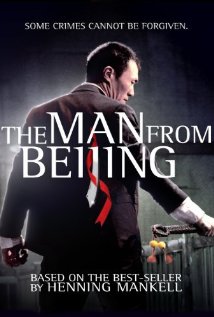
THE MAN FROM BEIJING
Germany/Sweden/Austria, 2011, 180 minutes, Colour.
Suzanne von Borsody, Michael Nyqvist, Claudia Michelsen, Amy Cheng, James Tanaeka.
Directed by Peter Keglevich.
The Man from Beijing is based on the novel by Hening Mankel. Mankel is a novelist with popularity, worldwide, not just in his native Sweden. He is most famous for his series of police novels featuring Inspector want under.
This film opens with a massacre in Sweden, mysterious, a suspect being Chinese swordsman. The film shows the police investigation but also involves a judge from Stockholm, in difficulties with her marriage, but finding that her parents have been killed in the massacre. She goes to the village, investigates on her own, interacts with the police investigator, and with the Chinese connection, including a massacre of the members of her extended family in the United states, she decides to go to Beijing.
In Beijing, there is a wealthy middle-aged man interested in Development – but who, it is revealed, is behind the massacres, employing one of his associates, a skilled martial arts swordsman, to go to Sweden as well as to the United States to massacre every member of the family. It eventually emerges, and is seen in sepia flashbacks, that one of the Swedes, a supervisor on the building of a railway line in Nevada in the 19th century, has been cruel to the Chinese, especially to a man and the violation of his wife who dies. The child escapes and later writes a history which comes into the possession of the man in China who vows to kill all members of the Swedish family.
The film has a strong central performance from Suzanne von Borsody as the judge, with Michael Nyqvist, ever more popular after The Girl with the Dragon Tattoo and his appearing in international films.
The film was a German production, with an Austrian director – and it sometimes seems incongruous that everybody, including the Chinese, are speaking in German, but this is of the nature of international co-productions.
1. An interesting television film/series? The popularity of the work of Hening Mankel? The various film and television versions of his stories, especially Wallander?
2. The title, the focus, Sweden, the US, China? 21st century, back to the 19th century? The musical score?
3. The opening, the Swedish village, the buildings, the hotel, the police?
4. China, Biejing, offices and Development meetings, hotels and streets, police precincts, the airport?
5. The man with the camera, photographing the house, hurrying in the car, the crash? The police arriving, the initial search, discovering more bodies, the massacre, the police reactions, physical and psychological? The authorities arriving? The mystery, one person committing the crimes? The nature of the
sword?
6. The visuals early in the film, and unrolling the manuscript, the ribbon, tassle, the images of the sword? The sweeping of the sword?
7. The police, Vivi in charge, finding all the bodies, the massacre? The different buildings, people in their ordinary situations, dead? The search for motives? The chief of police, Vivi and her searching, coping, the physical reactions? The young police and their assistance?
8. The judge, at home, waking, her husband, the relationship? The documents for the divorce? In court, the rape charge, the victim in court, the accused and his getting out? The judge at her suggestion of an appeal?
9. The media, the television, the phone calls, news about her parents, going to the site? The protocols, staying in the hotel, the reactions of the manager? His video, prying and the records, his time in jail? The judge and her stay, the room, information about the Chinese man, the video evidence, going to the police?
10. The judge and her discussions with Vivi, the rules, the information available, the judge added visiting the house, seeing her parents, collecting evidence, going back to the hotel, the interactions with the manager and her threats to him? Vivi and her bonding with the judge, trying to help?
11. The judge and her family, the American connections, the massacre there? Connections with the police in the US, sending the information, the presence of the Chinese man?
12. The judge, her husband, the phone calls, his support? Her decision to go to China, arrival, her being met, the hotel, the police briefing? The discussions at the restaurant with the police?
13. China, the meeting, the International Development situation, guests from Africa and other countries? The brother, his being wealthy, supporting development? His sister, in the police? The clashes? The revelation that he was behind the killings, having the document, its recounting of the history, the Swedish cruelty, his ancestor and his wife, his vowing vengeance, commissioning the killer, death to the whole family?
14. The visualising of the past, the Chinese in Nevada, the building of the railroad, the cruelty of the Swedish supervisors? The worker, his brother being killed, the wife arriving, the child? The Swedish abuse, the woman dying, the writing of the document?
15. The judge and her stay, seeing the photos, the enquiries, her husband arriving?
16. The policewoman, her work, the staff, support, with her brother? Meetings with the judge?
17. The killer, his attacks, the visualising of his martial arts skills, with the judge and her husband, his being shot?
18. The professor, meeting the judge, giving information, declining to be involved politically, inviting the judge to the Museum, his explanations about the history, the Chinese in America? The documents? The ribbons? His being murdered?
19. The confrontation between brother and sister, pushing her over the parapet, her death?
20. The judge and her husband, going to the airport, being detained, the interrogations, the admissions of the truth, the issues of vengeance?
21. Forgiveness, possible? Vengeance? Atonement?
Published in Movie Reviews
Published in
Movie Reviews
Tagged under
Saturday, 18 September 2021 19:54
Dolores Claiborne
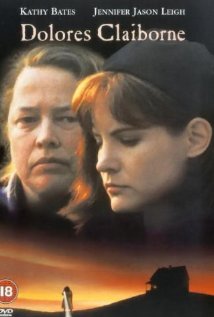
DOLORES CLAIBORNE
US, 1995, 132 minutes, Colour.
Kathy Bates, Jennifer Jason Leigh, Judy Parfitt, Christopher Plummer, David Strathairn, John C.Reilly, Ellen Muth, Eric Bogosian, Bob Gunton.
Directed by Taylor Hackford.
Dolores Claiborne is psychological drama at its best. Interestingly, it is based on the Stephen King novel, not a horror story, but more in the dramatic tradition of The Shawshank Redemption, Stand by Me…
The setting is Maine in the 1970s and the 1990s, capitalising on the coastal beauty and the way of life in Maine. It opens with an old woman falling down a staircase and her servant, Dolores Claiborne, standing over her with a rolling pin to kill her. Needless to say, appearances are not exactly the full truth.
Kathy Bates, Oscar-winner for her role, quite maniacal, in the film version of Stephen King’s Misery, is Dolores, who has worked for many years for a selfish and autocratic woman, Vera, played most effectively by Judy Parfitt. It is she who is dead at the beginning of the film. Dolores is held for murder, being pursued by a lawyer who had interrogated her 14 years earlier at the death of her alcoholic husband, David Strathairn, whose death was found to be accidental. The lawyer is played by Christopher Plummer, intense on getting a conviction this time. His assistant is played by John C. Reilly.
Jennifer Jason Leigh portrays Selena, Dolores alienated daughter, suspicious of her mother, idealising her dead father – though it is later revealed that she has suppressed memories of his sexual molestation. An ambitious journalist, dependent on drugs and alcohol, she comes to defend her mother even though not believing her. Ultimately, listening to Dolores’ story and gradually remembering the past, she comes to the defence of her mother.
The scenes between Jennifer Jason when Kathy Bates are intense. The clashes with Christopher Plummer also very intense. And the film has the advantage of the main action taking place in the present but frequently making transitions to the past, changing colour, Kathy Bates looking younger, Selena at 12-year-old, and revelations about Vera and her death. In fact, a number of sequences with Vera are shown after the sequences her death, especially as regards Dolores’ behaviour towards her husband, Vera, from intense personal feelings, inciting Dolores to kill her husband.
The film was directed by Taylor Hackford, who had a successful career for more than 30 years with a ride wide-ranging number of films, including the Oscar-winning Ray.
1. The character study, murder mystery, themes of sexual abuse, consequences?
2. From a Stephen King story? The Maine setting, locations, the town, the island, the ferry and the sea, the home and the grounds, the mansion and its grounds, interiors, police offices? Authentic feel? The musical score?
3. The present in the flashbacks? Change of colour, the insertion of the flashbacks, the occasions, explanations, cumulative effect – yet revealing key points before others and their place in the narrative?
4. The opening, the stairs, Vera falling, Dolores and the rolling pin, her being discovered? The reaction, the arrest? The police, Mackey and his attitude, Frank as assistant?audiences believing Dolores or not?
5. Selena at work, the office, the newspaper, the editor and her relationship, his wanting to cut her article, the smart remarks, wanting to go to Arizona, his refusal? The tension? The fax, the story about her mother, the covering threat?
6. Selena’s arrival, after 15 years, and memories, hiring the car, going to the police, the memories of Mackey, knowing Frank, seeing her mother, her mother’s surprise, welcoming her, her reaction to her mother, not believing her?
7. Mackey, in himself, the 14 years after the investigation of Joe’s death, the investigation at the time, interrogation of Dolores, her being acquitted? His waiting, his aggressive manner, presumption of guilt? His criticisms of Dolores, in Vera’s house, collecting the evidence, nasty remarks and slights, the will and his not believing Dolores not knowing, his reconstruction of the death, writing the report, delivering it? Selena reading it on the ferry, her reaction?
8. Vera, her fall, her appearance, her request? The memories of Vera, her arrival, imperious, with her husband, opening up the house? The interviews and her intimidation, Dolores response, being hired, the conditions? Visualising the washing, the cleaning, Dolores’ voice-over describing it, Vera’s demands? Her husband and the visit, his ignoring her? His death? Seeing herself as a bitch? And the use of this description by Vera, Dolores and Selena about themselves? The years passing, her age, Dolores’ reasons for staying, her relationship with Joe, needing the money for Selena’s education, working full-time, the passing of the years, Vera ill, ugly, touches of hatred, soiling her bed, forced to the toilet, Dolores bringing the food, Vera in the wheelchair, her going to the stairs, the reality of her falling down, wanting Dolores to kill her?
9. Dolores’s flashbacks to her husband, working with the boats, his drinking, his looking down at her, insulting her, spoiling Selena, his affection? Hitting Dolores, her pain, continuing to cook? The joke about his splitting his pants? Dolores finding the hole?
10. The flashback to weeping with Vera, Vera’s reaction, getting the story, her own experience, insinuating ideas for Dolores, inciting her to kill, the justification? The episode of the eclipse, the guests, Vera letting Dolores go home? Dolores and worry about Selena, Vera’s condemnation of Joe? Going home, the bottle of whiskey, Joe and his being jovial, yet aggressive, chasing her into the grounds, his falling, holding on, Dolores taunting him with the truth,
his falling?
11. Selena, staying with her mother, drinking, the pills, the phone calls, going shopping? In the house, in the room? Her attitude towards Dolores, towards her father, blaming her mother? Going to the house, Dolores’ possessions, the information about the will?
12. Selena wanting lawyers, her leaving, warning her mother to say nothing, reading the report, finding Dolores’ tape, listening to it? Selena on the ferry, suddenly seeing her father, the memories of his sexual behaviour, realisation of the truth? Her working at the hotel? The opportunity for her to come to terms with her past, her parents, her self-image?
13. The background of the money, Dolores banking her money every week, saving it over the years for Selena, at the bank, the manager and his stern behaviour, discovering the Joe had taken the money? Her later confronting him, his excuses?
14. The hearing, the officer presiding, Dolores telling the truth, Mackey and his demands, his reconstruction of the death, getting angrier? Selena explaining her mother’s behaviour, the fact that the two women loved each other? The issue of the will, Dolores not knowing, waiting all those years, the implausible time for allegedly killing Vera?
15. Frank, his testimony to Dolores’ reaction to knowledge about the will?
16. The presiding officer, listening, questioning Mackey and his motives, Selena’s challenge, Mackey giving in? Admitting his motivations?
17. The theme of memories, their importance, repressed memories?
18. The irony is about the truth and Dolores being responsible for Joe’s death, not Vera’s?
19. Victims, perpetrators, responsibilities and consequences?
Published in Movie Reviews
Published in
Movie Reviews
Tagged under
Saturday, 18 September 2021 19:54
Confession, The/ 2011
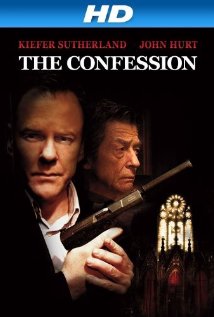
THE CONFESSION
US, 2011, 63 minutes, Colour.
Kiefer Sutherland, John Hurt, Michael Badalucco.
Directed by Brad Mirmin.
The Confession runs for only 63 minutes and is divided into 10 chapters. It was written and directed by Brad Mirman, who also wrote the screenplay for the 2004 film with Christian Slater, The Good Shepherd/ The Confessor.
The film is two hander, mainly set in a confessional, with Kiefer Sutherland as a professional hitman and John Hurt as the priest. The hitman does not want to confess but to talk about his life, trying to understand himself and his career and moral choices. He seems to want to have the priest as a sounding-board. At first, the priest said says the expected things about sin, good and evil, confessing, repentance, absolution.
The drama develops with flashbacks to a variety of cases where the hitman has killed, the priest asking whether he had any compassion, and something emerging.
Much of the dialogue is concerned with God, the gift of free will, human choices, living according to God’s law, God’s not intervening… This is made more interesting within the context of the drama and the interchanges. The killer challenges the priest and wants him to witness a murder so that he can understand.
Around the middle of the film, the audience will realise that the killer is the priest’s son, and the priest has to do a great deal of confessing himself, his past life where he has been responsible for the death of his wife as well as the brutalising of his son. It is clear that the son has come to kill his father while trying to understand himself and his life. With the seal of confession, the priest will be unable to reveal anything and will have to live in fear of his life – just as the son says he lived in fear of his father.
With its brief running time, the film provides a visual and aural opportunity to discuss the problems of evil and moral conscience.
1. The impact of the film, performances, drama, moral dilemmas, philosophical and theological explorations?
2. The brevity of the film, the two hander, the scenes in the confessional, in the church, ranging over the stained glass windows, statues? The scenes outside, the locations for the killings, the business office, the dark room, homes? The musical score?
3. The title, the focus on the confessional, the priest and his traditional role, hearing confessions, the penitent coming, 35 years, not wanting to confess sins, wanting to understand himself, confronting the priest, the priest’s own confession?
4. The strength of the performances, the range of emotions?
5. The theological discussions, the nature of the confessional, confessing sins, the killer wanting to understand himself, get a response from the priest, raise questions of God, the permitting of evil, human free will, the choices of evil, a person’s character and behaviour formed by their traumatic past? The nature of absolution, forgiveness, possibilities and forgiveness? Horror at listening to stories of murder? The seeking of compassion? The killer and his relating the stories, the quiet intensity, the challenge to the priest, the plan for a killing that night? when did the audience realise that he was the priest’s son? The flashbacks of his story, his hand, the burns, the confronting of the priest? The priest having to delve into his own past and confess?
6. The story of the killer, as a young boy, the brutality of his alcoholic father, the sadistic beatings, being locked up? His mother, the domestic violence, her desperation, her husband insulting, physically abusing her, going to the window, his taunting her to jump, the little boy coming in and seeing this, her jumping? The shock to the father? His abandoning his son? The boy in foster care, sexual abuse, a paedophile ring? His being drawn, emotionally and impassively into being hit man? The boss and the hit list? Matter is neither good nor bad, just jobs?
7. The flashbacks to the killings, the first, the gangster, his being afraid, asserting his authority, the junkie with the killer, the junkie unable to shoot, the killer shooting, then shooting the junkie? The visit to the home, the African- American man, no explanation of why he was to be killed, his boy coming down the stairs, his concern for his son? The effect on the killer, giving him the gun, asking whether he was willing to do everything, the man getting a promise from the killer, no bullets in the gun? His not being killed, but urged to go far away with his wife and child? The corrupt businessman, the embezzlement, his associate, thug, his being shot? The killer forcing the businessman to refund all the money? The businessman asking whether he was going to kill him? Saying that he was already dead? The killing in the corridor, hearing the shot?
8. The cumulative effect of hearing the stories? The planned killing for the evening?
9. The priest, age, experience, small parish, hearing confessions, friendly parishioners? The routine of the confession? His saying that he hadn’t experienced any of the kinds of killings described, nor this kind of confession, no preparation even in the seminary? His asking about compassion, hearing the story of the African- American man? Saying that he would never understand like the killer? Taught about whether the priest had ever heard all harmed someone? Otherwise you would be a saint?
10. The issue of power and control, killer liking control? The priest saying that he saw a boy making people afraid to get attention, even with the gun? Asking
whether you is an only child and was getting revenge for what people are done to him?
11. The killer wanting the priest to witness a killing that evening? The priest unwilling?
12. The killer continually raising the issue of God, not believing in God, seeing God as harsh, setting up life’s agendas, not intervening? Blaming God? The priest saying that all had to live according to God’s laws? The killer saying that God had a bigger hit list that he did? Less concerned about evil when it does not touch people? So, how can ridding the world of evil people be wrong? People who cause suffering and don’t care? The priest and the reply about free will, the gift of God, but God not intervening when bad choices were made? The nature of choice? The question of why people can’t control the darkness in their hearts?
13. The killer challenging the priest, why has become a priest, his motives? The bad that he had done in his life, the priest and listening to the story of the killer, the flashback, the burn in his hand? The priest and his fear? His confessing? That he was a man filled with anger? Claiming that he had changed? Expressing his sorrow?
14. The killer explaining the chance encounter with his father, noticing the collar, coming back, waiting for him?
15. The killer, the seal of confession, not killing him that night but any day, and the priest living in fear? Son living in fear of his father in the past, now the father living in fear of his son? The killer taunting his father about his faith, his doubts, his fidelity in living his priesthood or not? The father’s moment of sorrow not making up for fears of a lifetime? The son wanting his father to live a life time with the guilt of making his son who was?
16. On the one hand, a dissertation about good and evil, on the other, psychological two-handed drama?
Published in Movie Reviews
Published in
Movie Reviews
Tagged under
Saturday, 18 September 2021 19:54
Beautiful Girls
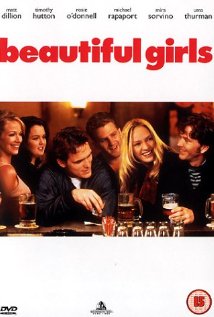
BEAUTIFUL GIRLS
US, 1996, 112 minutes, Colour.
Matt Dillon, Noah Emmerich, Annabeth Gish, Lauren Holly, Timothy Hutton, Rosie O'cDonnell, Max Perlich, Martha Plimpton, Natalie Portman, Michael Rappaport, Mira Sorvino, Uma Thurman, Pruitt Taylor Vince, Anne Bobby, Richard Bright, Adam Le Fevre, John Carroll Lynch, David Arquette, Sam Robards.
Directed by Ted Demme.
Beautiful Girls is an ensemble film from the mid-1990s, reflecting young adults, their attitudes, way of life – and, in retrospect, seeming far more responsible than young people 20 years later.
The focus is on Willie, played by Timothy Hutton, piano player returning home to give himself time to reflect on his engagement to Tracy, Annabeth Gish about his prospective marriage. His friends at home include Tommy, Matt Dillon, who is having difficulties in committing himself to Sharon, Mira Sorvino, and entangled with a married woman, Darian, Lauren Holly. There is also Paul, the immature young man, Michael Rappaport, still quite an adolescent in his approach, especially to women, infatuated with Jan, Martha Plimpton, is in a relationship with a meat-cutter, Adam Le Fevre.
There is also the older Mo, Noah Emmerich, and his wife, Anne Bobby, and children, getting entangled with his friends, especially in a fight to defend Tommy. Rosie O’ Donnell’s Gina, the older friend, has a show-stopping speech about men and their attitudes, pornographic magazines, men and their ineptitude is. Most impressive is Natalie Portman, after her appearance in Leon, playing Marti, the young but wise girl next door, who attracts Willie who has to act responsibly – but the audience will share his entrancement with her.
1. Title, expectations, the cast?
2. Life in the 1990s, for young adults, in America, universally?
3. The, look, streets, houses, bars, school reunion? The musical score, the range of songs?
4. Will, in himself, piano player, the bus, his arrival, met by Mo, home, his father watching the TV, his scatty brother, meeting Marti, friendship with her, her age? The story of Tracy and his relationship? Plans for the wedding? Undecided? Needing time and space? His old friends? Action, the snow, the fights, the meeting with Andera, talking with her, the ice fishing? His realisations? Tracy’s arrival, talking to her? Making the decision? The influence Marti? His future?
5. The men, in the snow, Tommy and Darian coming to the car with drinks? His past, the school hero, the relationship with Darian at the time? Kevin and his reaction? His friendship with Willie, Paul? His relationship with Sharon, unable to commit, hanging out with his friends? Sharon testing him, the party, his gratitude? Darian’s arrival, glamorous dress, her advances, Sharon leaving, his driving home, the break? His not going to the reunion, going to the bar, his being bashed by Darian’s husband? Hospital, the visits, Sharon and her care?
6. Paul, the type, driving the snow plough, his infatuation with Jan, jealous of her and the meat cutter? His work, the snowplough, putting the snow Jan’s door? His visiting her at the diner, the argument, the champagne ring, rejection? His being a mixture of the shrewd and the dumb? With the others, his advice? Andera, the attraction, the date, trying to make Jan jealous, the dance, Andera leaving? His defending Tommy, the group going to the fight, seeing Jan? The change, possibilities?
7. Mo, his wife and children, attitude towards Tommy and Darian, listening to Will, the fight against Darian’s husband, going the house, seeing the daughter and backing down?
8. His wife, the children, love for her husband, her disappointment about his going to the fight, listening to Gina, supporting Sharon, the talks with Tracy?
9. Sharon, the past, relationship with Tommy, protected by her mother, with Tommy, wanting commitment, the arguments, the advice from her girlfriends, setting up the party, leaving, her being upset, going to the hospital, caring for Tommy?
10. The reunion, people turning up, meeting, Darian present, and being told off going home? That she was mean?
11. Gina, friends, loud, her key speech about men in the shop, pornographic magazines, photos, the unreality of the sex photos, her blunt and explicit language about men and their attitudes and behaviour? Confronting Tommy and Willie?
12. Marti, the young girl, her age, name, interest and Willie, their talks, his attraction, holding himself back, her advances, not understanding? The farewell?
13. A cross-section of young adults in the 1990s?
Published in Movie Reviews
Published in
Movie Reviews
Tagged under
Saturday, 18 September 2021 19:54
Last of the Blonde Bombshells, The
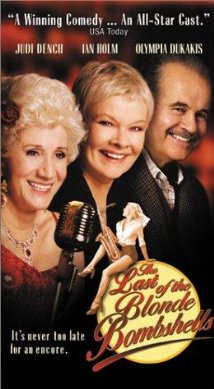
THE LAST OF THE BLONDE BOMBSHELLS
UK, 2000, 84 minutes, Colour.
Judi Dench, Ian Holm, Leslie Caron, Olympia Dukakis, Cleo Laine, Joan Sims, Billie Whitelaw, June Whitfield, Thelma Ruby, Millie Findlay, Felicity Dean.
Directed by Gillies Mac Kinnon.
Difficult to know what younger generations will make of this film, a trip down memory lane, to World War II, to the role of women during the war, to the woman’s band playing in clubs in London. Older audiences will find it quite nostalgic. This is especially the case with the images of the war, the clubs, the sailors and the other men, the styles of hair and clothes, the selection of favourite songs and their repetition.
And the cast is quite extraordinary, ranging from the serious Judi Dench, to the last film of comedian Joan Sims, to classic actress Billie Whitelaw, to television comedian June Whitfield, to the songs of Cleo Lane, and exotic French touch with Leslie Caron, the American touch with Olympia Dukakis. And Ian Holm plays Patrick, the male member of the band who donned women’s dress and wigs to play, as well as having a sexual relationship with most of the women.
The film opens in 2000, at a funeral, Judi Dench is Elizabeth burying her husband, explaining things to her granddaughter and what it was like for women during the war and the domestication afterwards. She plays the saxophone and joins a busker in the public area much to the horror of her family. Patrick turns up and she decides to try to get the band together, the film showing the visits to each of the women as well as flashbacks to their playing.
The goal is to play at a school function for her granddaughter, with some ups and downs, the group assembles, and the performances are success – and Elizabeth and Patrick might have a future together.
The film was directed by Gillies Mac Kinnon, a director of many genre films, A Simple Twist of Fate, Playboys, Pure, The Escapist.
1. British nostalgia? A millennium perspective on World War II in Britain?
2. The London settings, the present, the funeral, homes, restaurants, busking and playing, the locations for each of the members of the band, the school hall, performance?
3. London during the war in the club, the women playing, the men in the audience, the Blitz and its effect?
4. The school, the old favourites, the repetition throughout the film?
5. The top cast, screen presence, the variety of characters, serious, humorous, American, exotic French and the resistance, the vocals and Cleo Laine?
6. Judi Dench as Elizabeth, appearing at the funeral, her grief for her husband, the golf-player, and memories, ordinary life as a wife and homemaker? Sharing with her granddaughter? The meals, the family gathered, expectations of Elizabeth and her grief? Seeing the player, talking with him, joining him, the coins, the sharing of the money? The family seeing this, the reaction, sense of humiliation?
7. Patrick, his arrival, irresponsibility, the failures of his marriages, his betting, meals with Elizabeth, at home, meeting the family, justifying himself?
8. Elizabeth and her decision, to play, the photo of the band, the decision to reunite, search for the women? Finding Betty, playing the piano, her previous marriage to Patrick? Evelyn, her being in prison? Dinah, American, Scottish inheritance, in the castle, her drinking? Her attendant? Elizabeth flying, Patrick driving, home together? Gwen, singing in Wolverhampton and the clubs? Annie, conversion, playing with the Salvation Army, the religious arguments? The granddaughter, contacting friends, discovering Madeleine, memories of her leaving for the French resistance?
9. The memories, the band playing, the dress, the blondes, their title, singing, the men’s response? Elizabeth as a schoolgirl, arriving to put on the wig? Patrick, his interest, in drag, playing, at the toilet and the discussions, the arrest, his enlistment? The end of the film, the hearts on the drum, the sexual relationship with all the girls except Elizabeth?
10. Elizabeth explaining situations to her granddaughter, the role of women in the war, the jobs that they had, becoming more domestic after the war?
11. The women coming together, the characters, going to the school, precarious situations about the performance, Gwen turning up, the kids, their parents, listening to the modern group and the applause, the Bombshells singing, playing, the adults dancing, the children listening?
12. Elizabeth, her arguments about Patrick, the attraction, playing golf, the resistance, their future?
Published in Movie Reviews
Published in
Movie Reviews
Tagged under
Saturday, 18 September 2021 19:54
License to Wed
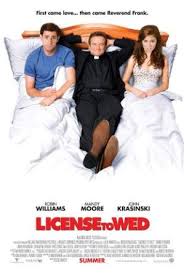
LICENSE TO WED
US, 2007, 91 minutes, Colour.
Robin Williams, John Kraskinski, Mandy Moore, Eric Christian Olsen, Christine Taylor Peter Strauss, Grace Zabriskie, Roxanne Hart.
Directed by Ken Kwapis
The film-makers and the publicists have been at pains to explain how important marriage preparation is these days, that too many couples rush into marriage without knowing each other very well and with the presumption that divorce is an easy way out or even inevitable. One can’t really disagree with that.
Which means that the premise of License to Wed is very important.
But…!
How they have treated it is often quite off-putting.. They have created the character, the Reverend Frank, who is the last word (or the last gasp) on marriage counselling. He has his own program that the couple has to pass. His method is part showbiz, part con tricks and part prurient curiosity – along with a smart mouth for sexual innuendo that shows a worldly wisdom but also a leering sense of humour. So far, so bad.
Reverend Frank is played by Robin Williams, not quite in his frequent manic style, but manic nonetheless. Most churches will be eager to check what denomination he belongs to. He has married, so despite his collar, he is not a Catholic. His church has a Pentecostal choir and a more Protestant looking altar – though he is vested. Episcopalian? One presumes that most Episcopalians would hope not, especially because of his sidekick, a largish boy, always there, who is in training for ‘the priest of tomorrow’ and seems to presume that the main quality of priesthood is fascist demanding of obedience. He is quite creepy.
Reverend Frank uses role-playing, gestalt therapy exercises which are played for disbelieving laughs rather than realism. Where most would be aghast (even though it is also meant to be funny) is the Reverend’s bugging the couple’s room in case they had premarital sex – enabling him to knock on the door as preventative tactics.
The rather controlling bride-to-be (toothy and smiling Mandy Moore for whom any word of Rev. Frank is taken as infallible) is all for the course, especially the writing of the vows. The husband to be (John Krasinski) finds it all exasperating and can’t write vows – and we tend to be on his side. When he punches Frank out, one is tempted to cheer. But, of course, it all ends well because (happily) they do get to know each other, (unhappily) because Frank will be part of their lives from now on. Unless he is in gaol for stalking or some such crime.
Published in Movie Reviews
Published in
Movie Reviews
Tagged under
Saturday, 18 September 2021 19:54
Zaytoun
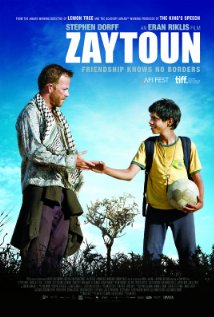
ZAYTOUN
Israel/France, 2012, 110 minutes, Colour.
Stephen Dorf, Abdalla El Akal, Alice Taglioni.
Directed by Eran Riklis.
Eran Riklis has made some significant films about Palestinian- Israeli relationships. The most moving and significant was The Lemon Tree, seen around the world. He also made The Human Resources Manager in a story set in Romania as well as the sports coaching film, Playoff.
This film is set in 1982, with Israeli hostilities towards Lebanon, seen in such films as Beaufort, Lebanon, Waltz with Bashir. The focus is on the Palestinian camp outside Beirut, and a young boy whose mother is dead, whose zealous father is suddenly killed on the streets, with the support of grandfather, and friends who do with him to sell goods on the streets of Beirut. When an Israeli jet is downed and the pilot ejects, he is captured and kept in a dark room. The young boy shoots him and he has to go to hospital just as one of the boy’s friends has been shot by guards in the street.
The boy decides that he would like to go with the pilot into Israel and into the Palestinian territories to see his old house and plant his father’s small olive tree, that being the meaning of the title, Zaytoun.
But then the film is something of a road film, the dangers of travelling around Lebanon and being interrogated by the police, crossing the border where the pilot is welcomed, where the UN have some jurisdiction. The pilot and the boy are given 24 hours to travel to find the house, which they do, in ruins, and the boy plants the tree.
The film is realistic but also an allegory of the possibilities of bonding between Israelis and Palestinians.
1. The work of the director? Israel and Palestine reconciliation? Israel and its policies, history?
2. The film and its realistic story, yet symbolic? Zaytoun, the word for “olive” – and the symbolism of planting the tree in Palestine?
3. The situation in 1982, in Israel, the Palestinian camps in Lebanon, the role of the PLO, Israel’s aerial attacks, difficulties on the border, pressurising the Palestinians?
4. The location photography, Lebanon, Beirut, the streets, the internment camp, the countryside? The border with Israel? The UN? The ruined homes in Palestine? The musical score, moods – and contemporary songs like Stayin’ Alive?
5. The introduction to Fahad, selling on the streets of Beirut, his stores, the UN woman buying something, talking to him, the police rounding the boys up, his friends, their being chased? At home, his mother dead, grandfather and support, his father and his militancy, rushing to help and being killed? The olive tree and the hopes for planting it? Having the key of the house?
6. The military training for the boys, their attitudes, anti-Israel, the jets flying over, the boys outside the camp, running across the space and risking being shot, Ahmed being shot?
7. Capturing the pilot, binding him, not giving him water, Fahad shooting him in the hip, his being in hospital, Ahmed coming, the two together, the work of the doctor? Ahmed dying?
8. The Lebanese authorities, the police? Talking with the boys, the gun?
9. Yoni, his story, strong Israeli stances, the photo of his pregnant wife, his missions?
10. Fahad, talking with Yoni, trying to persuade him to take him into Israel and to Palestine? To contact the US Embassy? Fahad and his tree? Yoni, the taxi, going back for Fahad, the trip, the driver and the promise of money? Fahad and his giving Yoni the wrong words, swear words instead of greeting?
11. Fahad, his age, his experience, the effect of what was happening in Palestine, hostility to Israel? His grandfather and his patience, his hopes?
12. The escape, the ups and downs, changing situations, the taxi, the promise of money, the authorities, the markets and buying goods, the petrol station, on the run and taking the truck?
13. Driving to the border, Yoni and his wound, Fahad tending it with herbs and alcohol? The crash? the police questioning Fahad, assuming Ahmed’s identity, Fahad knowiing that they were testing about the teacher at school? Rescuing the car, not putting on the brake? Walking, the donkey ride, the dangers in the minefield?
14. The border, Yoni being welcomed, the UN? Discussions about Fahad? His silent reactions? The new clothes and sneakers?
15. Official discussions, the decision to give Yoni 24 hours, driving, through the night, guessing the way to the village, finding it, the ruined house, the door and the key, planting the olive tree?
16. The return, Fahad happy with what he had achieved? Yoni and his promise to visit him? The embrace?
17. The film story and the possibility for bonding between Israelis and Palestinians?
Published in Movie Reviews
Published in
Movie Reviews
Tagged under